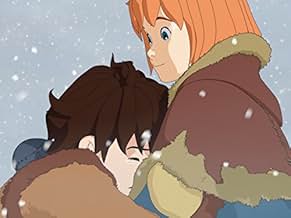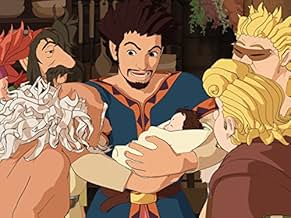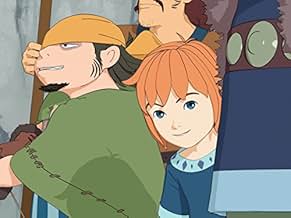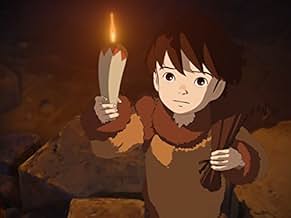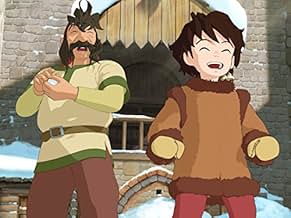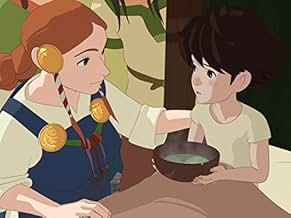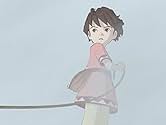Adicionar um enredo no seu idiomaThe story follows Ronja, a young girl whose father is the chief of a tribe of bandits. They live in a huge castle in the forest with the bandits. In this story Ronja encounters mystical crea... Ler tudoThe story follows Ronja, a young girl whose father is the chief of a tribe of bandits. They live in a huge castle in the forest with the bandits. In this story Ronja encounters mystical creatures as she explores and experiences life in the forest. Somewhere along the lines she ma... Ler tudoThe story follows Ronja, a young girl whose father is the chief of a tribe of bandits. They live in a huge castle in the forest with the bandits. In this story Ronja encounters mystical creatures as she explores and experiences life in the forest. Somewhere along the lines she makes friends with another young child much like herself. The title is based on the fantasy ... Ler tudo
Avaliações em destaque
I'm from Sweden, born in the early 80s. I grew up with Astrid Lindgrens books and the TV-series and movies based on them. They are widely considered great stories, and I agree. But I cannot say that any of them really have deeply moved or affected me, including Ronja Rövardotter. Up until now. The fact that it took a Japanese animation studio for me to realize just how good this tale is says something about this series.
I was a bit skeptical to the visual style first, and it took a few episodes before I gave in, but after that, I just loved it. The cell-shaded style reminds me of The Legend of Zelda: Breath of the Wild, another Japanese masterpiece, and there is something beautiful to behold in almost every scene.
Studio Ghibli have treated this story with utmost respect and it shows that they really have understood it, which may sound trivial, but I think it isn't. The central characters feel very lifelike, with all their strengths, flaws, vulnerabilities, prides, fears and hopes. I can't imagine anyone doing a better work, and the attention to detail is just incredible. Just one in a myriad of examples: when Ronja goes skiing in the winter, it shows that they must have studied exactly how a person moves on skis.
Another thing I admire with studio Ghibli's work is that they have the courage to stay in a moment, and portray beautiful things, even small things like raindrops falling on leaves. Their love for nature really shines through, and it makes you want to also be in that beautiful forest - hadn't it been for the horrible harpies.
I watched this in Japanese with English subtitles, which I strongly recommend over the English dubbed version, if possible. I like how they have kept all the original names and to hear them pronounced in Japanese. Many of them sound strange also in Swedish even for a Swedish person; Astrid Lindgren apparently got most of them from a map of northern Sweden.
Thank you, studio Ghibli, for this. I'm very grateful. Domo arigato gozaimasu.
Some of the voice talent seems a bit miscast. That said, the performances do grow on you The 3D animation takes a bit of getting used to. The character of Mattis is somewhat irritating and feels a little bit too melodramatic.
The good?
In watching the initial episodes, the animation was decent and the story seemed a bit slow at times. Stick with it. It's touching, fun, sad poignant, perilous and magical with some genuinely scary characters added to the mix. For the most part it is gentle, touching on friendship, relationships and a love of the outdoors. Much to my surprise, I've fallen in love with it, and the characters (mostly).
The backgrounds are sumptuous, and despite my previous comments the 3D, while occasionally a bit clunky, really grows on you, and in fact is really quite good. There are some very special moments that are worth waiting for, you'll know them when you see them, which take this way beyond just a childish cartoon into something with quite a powerful message that is of use to us all.
There are a few scenes that just blew me away, that were totally unexpected and unusual (?) in a "kids" production. A result of the ethos of not talking down to children at Ghibli?
This isn't just a collection of independent episodes either, with is a clear story arc running through the whole series.
A slow burner that will eventually melt your heart. It really is enchanting.
Edited to add:
I'd never read any of Astrid Lindgren's books and after watching the series, out of sheer curiosity, I've read the book. What is most surprising is that the series reflects the book perfectly. It is unusual in that it is a complete and true adaptation, to the extent that most of the (English Language version) dialogue is taken straight from the book. Much credit should go to the producers at Ghibli for having the courage to make it this way!
Você sabia?
- CuriosidadesInterestingly this is not the first time a Miyazaki has been interested and involved in adapting a work by Astrid Lindgren. Gorô Miyazaki's father, Hayao Miyazaki had been interested in adapting "Pippi Longstocking" another one of Lindgren's works and started development in the late 1970s and personally met with Lindgren but she ultimately refused Miyazaki's request.
- ConexõesReferenced in Troldspejlet: Episode #50.7 (2014)
Principais escolhas
- How many seasons does Ronja, the Robber's Daughter have?Fornecido pela Alexa
Detalhes
- Data de lançamento
- Países de origem
- Central de atendimento oficial
- Idiomas
- Também conhecido como
- Ronja, the Robber's Daughter
- Empresas de produção
- Consulte mais créditos da empresa na IMDbPro
- Tempo de duração
- 25 min
- Cor
- Mixagem de som







